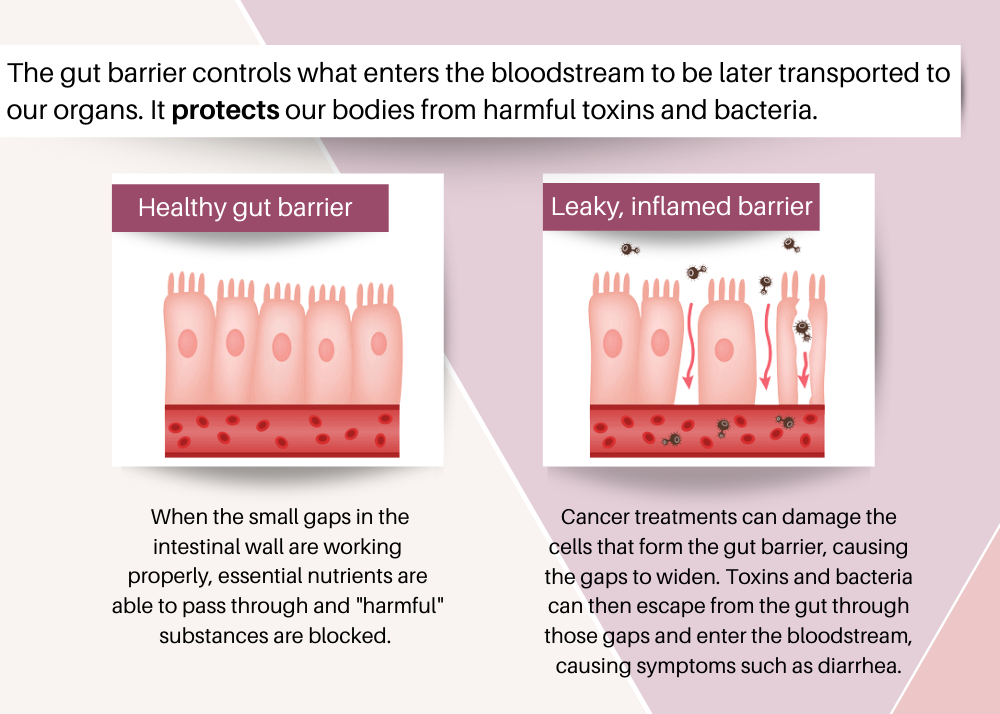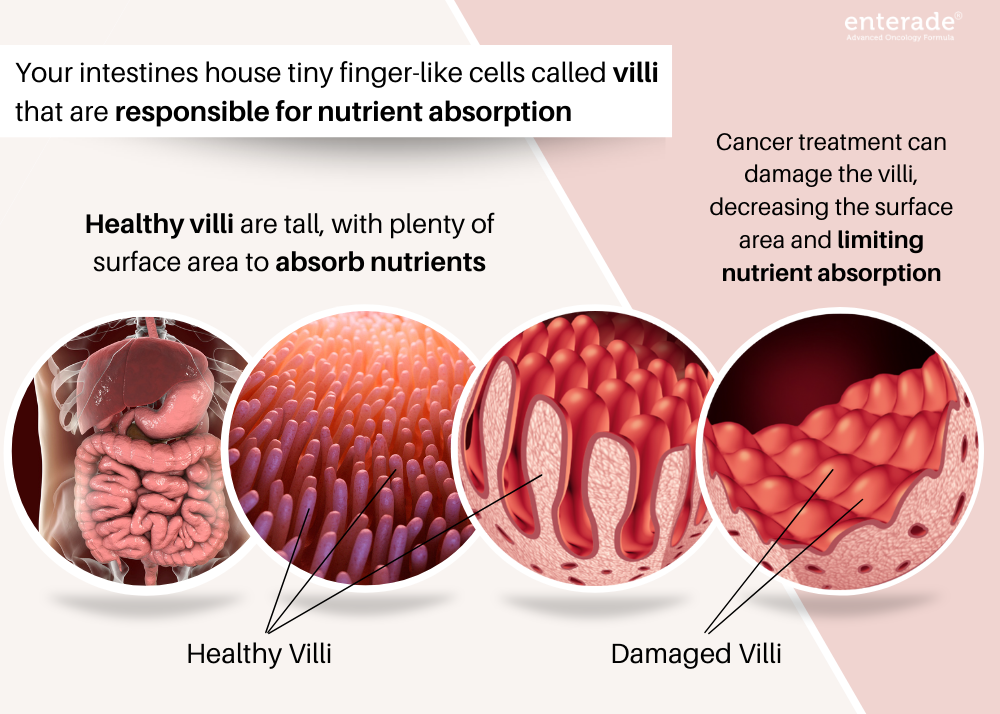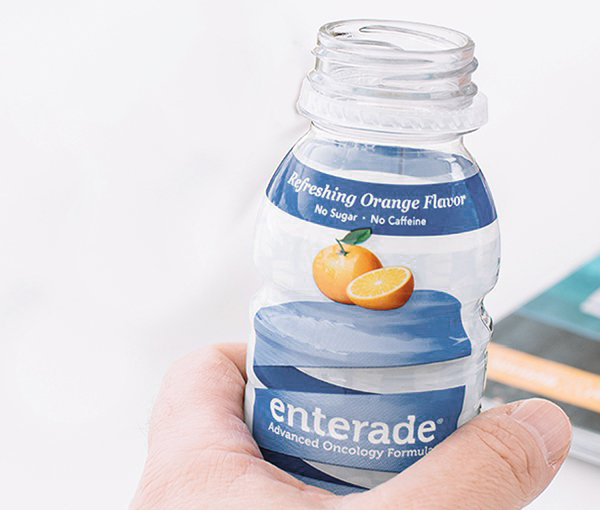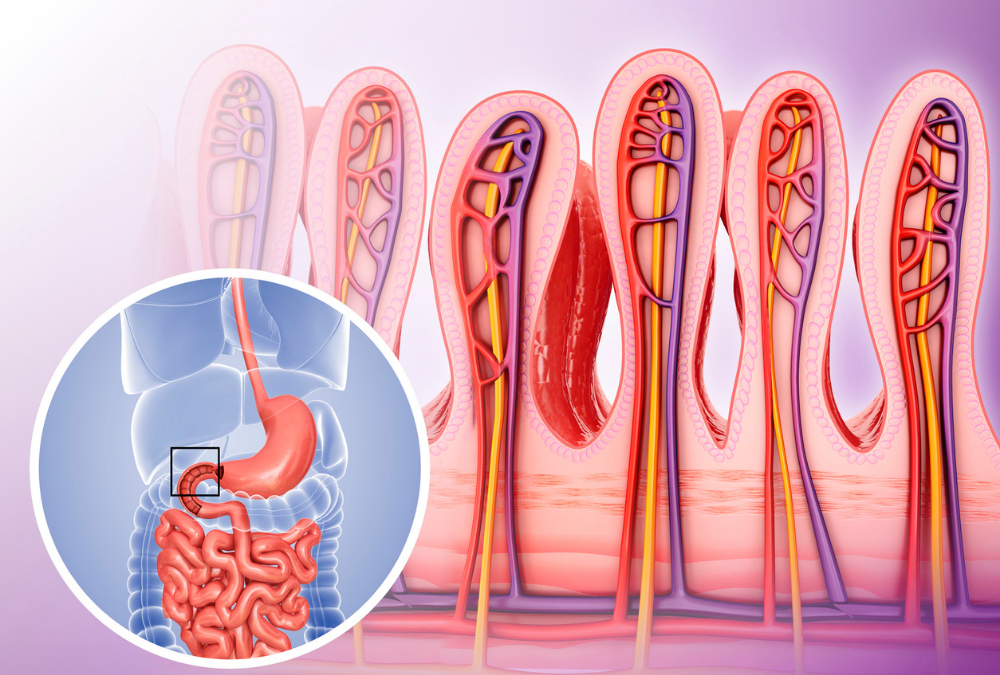How does cancer treatment impact the GI tract?
Chemotherapy, radiation treatment, and immunotherapy act aggressively on rapidly dividing cancer cells, but also affect healthy, non-cancerous cells that are rapidly dividing, including those that line the GI tract. This damage results in symptoms such as diarrhoea, nausea, vomiting, dehydration, and weight loss. These are some of the most common physical side effects patients experience and have the greatest impact on quality of life.

Symptoms can become significant enough that patients often choose reductions in or discontinuation of treatment.
As mentioned above, treatments such as chemotherapy and radiation target rapidly dividing cells–that’s why they work so well to combat cancer cells. The cells that line our gastrointestinal tracts (this includes both our stomach & intestines, along with other vital organs) are also rapidly dividing. Treatments can’t necessarily distinguish between “bad” cells and “good” cells, so our GI tract unfortunately takes on a lot of damage.

Our small intestine houses tiny, fingerlike projections called villi. Villi are cells responsible for nutrient and electrolyte absorption. Healthy villi have a large surface area, allowing ample space for the nutrients in the foods we’re consuming to be absorbed into the body. Cancer treatments damage these cells, causing them to shrink. This decreases the amount of surface area that can absorb nutrients, resulting in weight loss, fatigue, malnutrition, etc.
Along with breaking down food and absorbing nutrients, the digestive tract also works to protect our bodies from harmful toxins. The walls of our digestive tract form what is called the “gut barrier.” The gut barrier controls what enters the bloodstream to be later transported to our organs. When the tight junctions (small gaps in the intestinal wall) are working properly, essential nutrients are able to pass through and “harmful” substances are blocked. Cancer treatments can damage the cells that form this barrier, essentially causing these gaps to widen. Toxins and bacteria can then escape from the gut through those gaps and enter the bloodstream. This can lead to negative health outcomes in the rest of the body including diarrhoea, nausea, dehydration, fatigue, and even possible infection.
How can enterade® help?
Enterade® Advanced Oncology Formula is a sugar-free medical food blended with plant-based amino acids, electrolytes, and lightly sweetened with stevia leaf extract. Enterade® was developed by oncologists and gastroenterologists and is clinically proven to reduce the gastrointestinal side effects of treatment including nausea, diarrhoea, dehydration, fatigue, and unwanted weight loss.

We often hear “why can’t I just drink sports drinks?” or “this sounds like a pricey nutritional shake…”
Enterade® Advanced Oncology Formula, unlike sports drinks that address only dehydration and shakes that address caloric intake (and are often packed to the brim with sugar), serves a true purpose in helping to repair your gut from the damage caused by cancer treatments.
Backed by four published, peer-reviewed clinical studies, enterade® has earned its stripes as “more than a sports drink.” *
Enterade® is formulated with a proprietary blend of five plant-based amino acids: L-Aspartic Acid, L-Valine, L-Serine, L-Threonine, and L-Tyrosine. This patented formula has been developed to specifically address the damage caused to the GI tract from cancer therapies. There are very few products, if any, that are made to address these problems.
The proprietary blend of plant-based amino acids in enterade® is the secret sauce, so to speak.
We talked about how cancer therapies shrink or “blunt” the villi that are responsible for nutrient and electrolyte absorption. Enterade® nourishes the villi and improves villus height. In other words, enterade helps to rebuild the villi, which increases its overall surface area and allows more space for nutrients to be absorbed. Increased nutrient absorption is key to maintaining a healthy weight–a critical component in your fight against cancer.
enterade® helps to close the gaps in the gut barrier that form due to damage from cancer treatments. Keeping the gut barrier fortified helps protect your already compromised system from increased exposure to toxins so you can feel better and fight harder.
Lastly, enterade® is not a sports drink but enterade® IS formulated with HydroActive Techology® to hydrate better than leading sports drinks, oral rehydration solutions, and even water.
References
- Luque L, Cheuvront SN, Mantz C, Finkelstein SE (2020) Alleviation of Cancer Therapy-Induced Gastrointestinal Toxicity using an Amino Acid Medical Food. Food Nutr J 5: 216. DOI: 10.29011/2575-7091.100116)
- Can an amino acid-based oral rehydration solution be effective in managing immune therapy-induced diarrhoea? J.D. Hendrie, A. Chauhan, N.R. Nelson, L.B. Anthony Medical Hypotheses 127 (2019) 66–70 0306-9877/ © 2019 Elsevier Ltd
- enterade® to Reduce Diarrhoea in High Dose Chemotherapy Patients DOI:10.31557/APJCP.2021.22.1.301 Zachariah De Filipp1, Brett Glotzbecker2, Laura Luque3*, Haesook T Kim4, Katherine M Mitchell3, Samuel N Cheuvront3, Robert J Soiffer2
- Chauhan et al. BMC Cancer (2021) 21:580 Chauhan et al. BMC Cancer (2021) 21:580 Can an amino acid mixture alleviate gastrointestinal symptoms in neuroendocrine tumour patients?

